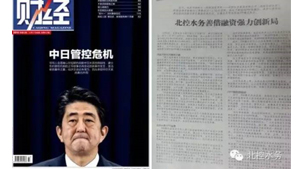China Environment News | Clean Water from Sewage Treatment 2015-12-25

Jinan Zhongkecheng Water Quality Purification Co., Ltd. carries out construction, operation, management using BOT mode. The daily domestic wastewater treatment capacity is 34,000 tons.

Xiajin County Government, Shandong Province builds a wetland covering an area of 300 mu with 40,000 tons of reclaimed water from sewage treatment plant, featured with functions of ecological regulation, improving water quality, water conservation and sightseeing. The sewage after deep purification treatment ensures the water quality safety South-to-North Water Diversion project.


In September 2015, BEWG launched the Waterworks Energy Efficiency Management System to build the electric energy measuring, statistics, and analysis system for water works covering all operating companies.

Through technological transformation, the power consumption per ton water of Xiajin Hongtai Jiacheng Water Co., Ltd. is reduced by 18.9%, saving electric bill of 599,200 yuan per year.

Jinan Zhongkecheng Water Quality Purification Co., Ltd. uses efficient air suspension fans by technological transformation. The fan efficiency is increased by about 70%, and power consumption per ton water is reduced by 28%, saving electric bill of more than 60 million yuan per year.

SK Gas Station Carwash of Jinan High-Tech Zone uses reclaimed water to wash cars, saving capital of 10,000 yuan per year.

The rapid urbanization process has made China face water shortage challenges, more than 400 cities in China are lacking of water with the average daily water shortage of 16 million cubic meters, equivalent to annual average water consumption of nearly 16 million people.

Shengxin Greening Company is providing greening services for Jinan High-Tech Zone. Tap water was used for watering with daily consumption of nearly 500 cubic meters of groundwater, and reclaimed water is used for irrigation, saving cost about 10 million yuan each year.

Beijing Enterprises Water Group Limited (“BEWG”) has announced that it got a US$ 300 million long-term concessional loan from the International Finance Corporation (IFC), a member of the World Bank Group, for the acquisition, construction and operation of sewage treatment and tap water projects in China. This is another international loan after getting loans from Asian Development Bank (ADB) in 2014, which fully reflects the IFC’s strong recognition of BEWG’s business model, environmental construction capacity and operational management capability, and strong confidence in the development of China's water industry.
BEWG is a comprehensive and leading professional water services and environmental protection services provider covering industrial investment, design, construction, operation, technical service and capital operation in full industrial chain. So far, it has invested more than 300 domestic water projects, covering more than 20 provinces and autonomous regions and 100 prefecture-level cities, with a planned water treatment capacity of 25 million tons/day.
Faced with the broad development prospects of the industry and the rapid changes in market conditions, BEWG actively opened up capital financing channels. After an expert group from ADB carried out inspection for a period of 9 months, and due diligence on BEWG and financial indicators, production and operations, technical level, environmental achievements and the social security system of its investment projects, they highly recognized BEWG’s business model and operational management capabilities. In 2013 and 2014, BEWG got a total of US$ 408 million loan from ADB. Under the support of loan fund of ADB, BEWG has upgraded and operated a number of sewage treatment plants throughout the country, which met the most stringent Grade I A sewage treatment standards, paving the way for using the reclaimed water for industrial engineering, municipal facilities and miscellaneous uses.
The rapid urbanization process has made China face water shortage challenges, more than 400 cities in China are lacking of water with the average daily water shortage of 16 million cubic meters, equivalent to annual average water consumption of nearly 16 million people. Improving the quality of wastewater treatment can effectively respond to current water challenges. Through the appropriate technical treatment, the sewage can meet specific needs for equipment cooling, cleaning and boiler operation and other industrial areas.
The funds have supported the investment, construction, upgrading and operation of 69 BOT and TOT projects, covering 8 provinces and 42 regions. The treatment capacity of newly increased sewage, reclaimed water and tap water is about 2.2 million tons/day. The treated effluent quality meets the requirements of recycled water quality and can be used for industrial cooling and urban environment.
In accordance with the “12th Five-Year Plan” of national urban sewage treatment and recycling facilities construction, the reclaimed water use rate of urban sewage treatment facilities shall reach more than 15% by 2015, a huge gap between China and the international developed countries. Yu Liguo, Vice President of BEWG said that the total sewage treatment capacity of BEWG totaled 2 billion tons in 2014, and the yield of water meeting Grade IA discharge standard accounted for 80%, or 1.6 billion tons, which can be used for greening, landscape and agricultural irrigation. However, only the reclaimed water of the sewage treatment plant is used for afforestation, mud and backwash water, the annual reclaimed water utilization amount was only 400 million tons in 2014, the rest of which was discharged to rivers, that is, the actual use of recycled water only accounts for 0.25% of renewable water resources. The promotion of reclaimed water has a very high correlation with the support of the national policy level, which needs to introduce social funds via various channels, and expand the PPP and the government procurement service mode to solve the investment security and end user issues.









